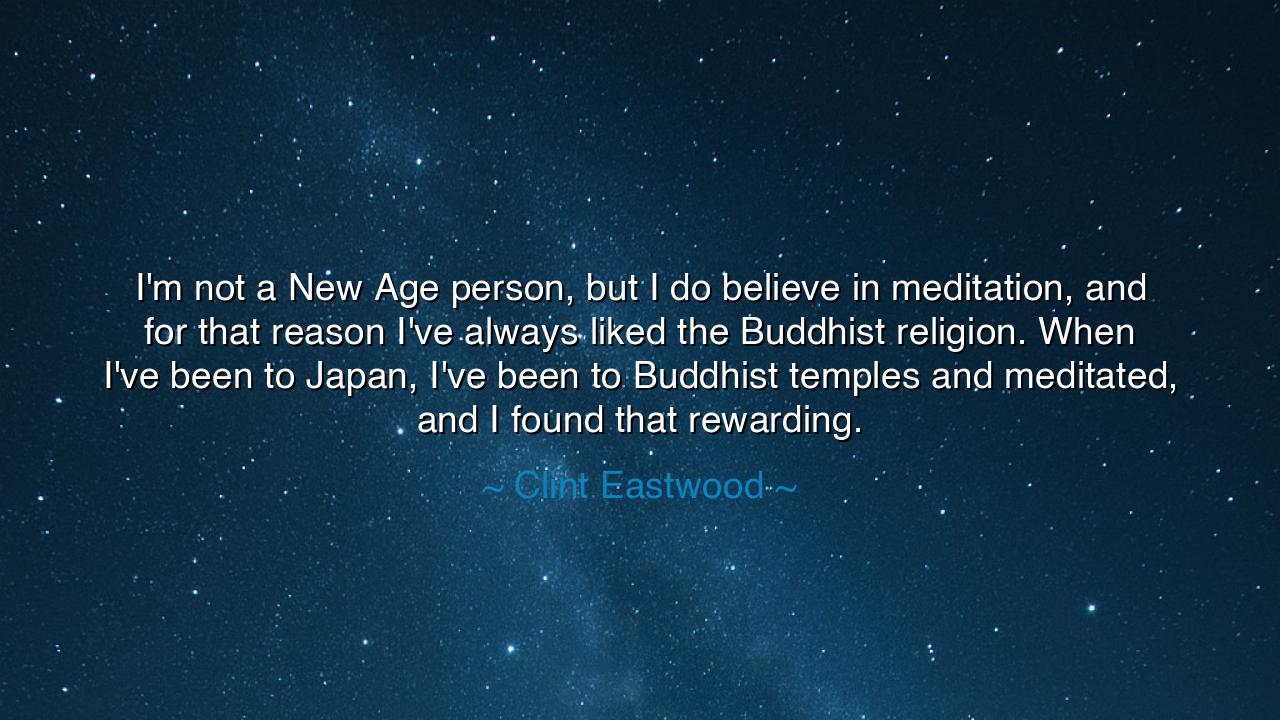
I'm not a New Age person, but I do believe in meditation, and for
I'm not a New Age person, but I do believe in meditation, and for that reason I've always liked the Buddhist religion. When I've been to Japan, I've been to Buddhist temples and meditated, and I found that rewarding.






The wise and steadfast Clint Eastwood, whose face has weathered both the storms of the screen and the seasons of life, once said: “I’m not a New Age person, but I do believe in meditation, and for that reason I’ve always liked the Buddhist religion. When I’ve been to Japan, I’ve been to Buddhist temples and meditated, and I found that rewarding.” These words, quiet and unpretentious, reveal the philosophy of a man who has walked through both the noise of fame and the silence of reflection. Beneath their simplicity lies an enduring truth — that inner peace is the highest form of strength, and that wisdom grows not from the chaos of ambition, but from stillness of mind.
The origin of this reflection lies in Eastwood’s long and contemplative relationship with the practice of meditation. Known to the world as a figure of grit and stoic resolve — the gunfighter with narrowed eyes and steady hand — Eastwood, in truth, has always carried a contemplative heart. Behind the iron exterior of his cinematic persona, he found solace in the teachings of Buddhism, particularly its emphasis on mindfulness and detachment. Though he rejected the label of “New Age,” which often implies the pursuit of fashionable spirituality, he embraced what is timeless — the quiet discipline of stilling the storm within.
There is profound humility in his words. Eastwood does not claim enlightenment, nor does he preach doctrine. He speaks as a traveler who has glimpsed the temple of peace and returned to tell others that it is real. His mention of finding meditation “rewarding” is not the boast of conquest, but the quiet confession of discovery. In this, his voice joins a chorus of ancient seekers who have found strength in silence. For meditation, as the Buddha taught, is the art of returning to the center — of seeing clearly without the distortion of desire or fear. To meditate is not to escape life, but to meet it with calmness and clarity.
We may recall the story of Miyamoto Musashi, the famed Japanese swordsman and philosopher. Like Eastwood, he was both warrior and sage. In his youth, Musashi fought with fury and arrogance; in his age, he sought stillness and enlightenment. He learned that mastery of the sword was meaningless without mastery of the self. His later writings speak not of battle, but of balance — not of killing, but of peace. When Eastwood knelt in Buddhist temples in Japan, perhaps he too felt this ancient truth: that the greatest victory is not over others, but over the restless mind.
The meaning of Eastwood’s words reaches beyond religion and into the core of human existence. In an age of distraction, where thoughts run faster than time itself, meditation becomes an act of rebellion — a sacred refusal to be consumed by noise. Through stillness, one learns patience; through silence, one learns truth. The Buddhist path, which he admired, is not about rituals or labels, but about cultivating awareness — the power to observe without judgment, to live each moment with full presence. This, Eastwood recognized, is not weakness but strength: a strength that does not shout, but endures.
There is also a lesson here in humility and openness. Eastwood, a man of action and fame, found guidance in a tradition born in another land, another time. He did not let pride or culture close his mind. The wise do not ask where truth comes from; they recognize it when they find it. And he found truth in the discipline of meditation, in the quiet stillness of temples where words fall silent and the heart becomes its own teacher. His example reminds us that learning never ends, and that peace is not owned by any faith — it is the birthright of every soul willing to seek it.
The lesson is clear and enduring: find time to be still. In the rush of life, make room for silence. Let your thoughts settle like dust upon the ground, until the air of the mind becomes clear once more. Whether you sit in a temple or in your own room matters little; what matters is that you learn to listen — not to the world, but to yourself. The world may tell you to act, to win, to conquer — but the spirit whispers only this: be still, and you will understand.
Thus remember, O seeker of calm, that wisdom does not shout from the mountaintop; it is heard only in the quiet valley of the soul. You need not wear robes or speak mantras to walk the path of meditation. You need only the courage to turn inward. For as Eastwood discovered, the truest reward is not found in applause or achievement, but in the simple peace that rises from stillness — the peace that cannot be taken, because it was never given by the world.






AAdministratorAdministrator
Welcome, honored guests. Please leave a comment, we will respond soon